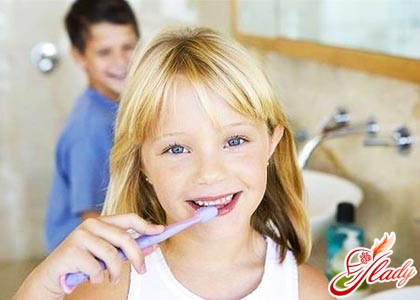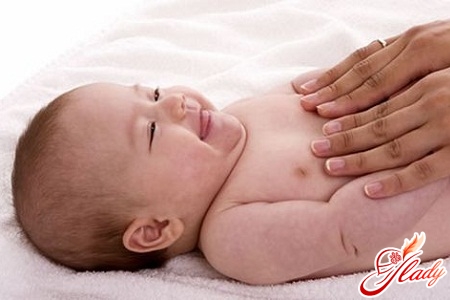 Prevention of dental caries in children is very important.an important task for all parents without exception. Unfortunately, in recent years the problem of caries in children has become very acute - it occurs even in the smallest children, who have not yet reached the age of two. In fact, teeth, having barely erupted, immediately begin to deteriorate. And often it is the parents who are to blame for the fact that the baby begins to develop caries. After all, parents should carefully monitor the condition of their children's teeth and teach them the basics of dental care. And in order to successfully cope with this task, parents must know all the nuances concerning childhood caries and its prevention.
Prevention of dental caries in children is very important.an important task for all parents without exception. Unfortunately, in recent years the problem of caries in children has become very acute - it occurs even in the smallest children, who have not yet reached the age of two. In fact, teeth, having barely erupted, immediately begin to deteriorate. And often it is the parents who are to blame for the fact that the baby begins to develop caries. After all, parents should carefully monitor the condition of their children's teeth and teach them the basics of dental care. And in order to successfully cope with this task, parents must know all the nuances concerning childhood caries and its prevention.
Causes of caries
Caries is exactly the same disease asall other diseases. And this means that it will not arise out of nowhere - certain provoking factors are needed. And it is simply necessary to know these reasons, because by eliminating them, you significantly reduce the risk of developing caries:
- Presence of diseased teeth.If there is at least one diseased tooth in the oral cavity, all the others begin to deteriorate with alarming speed. Therefore, the child should be regularly examined by a dentist, and if there are carious teeth, they should be treated immediately to protect the neighboring ones.
- Dental plaque and tartar.As surprising as it may seem, even in children, not only plaque, but even tartar is a fairly common occurrence. And both plaque and, especially, tartar are an excellent environment for the reproduction of bacteria, which ultimately lead to the development of caries.
- Poor nutrition and poor drinking water.As everyone knows, fluoride, calcium and vitamin D are essential for healthy teeth. However, many parents completely forget about this important fact, buying various sweets for their child, and leave healthy products without due attention. Be sure to review your child's diet, discuss it with your doctor - pediatrician.
- Enamel damage.If a child eats excessively hot or cold food, especially alternating them, there is a very high risk of developing microscopic injuries to the tooth enamel. Therefore, do not let the child drink, for example, cold milk with soup. Unfortunately, this phenomenon occurs all the time. In addition, these enamel injuries are often caused by mechanical damage, for example, if the child gnaws nuts. This should also be avoided.
- Genetic predisposition.Dentists often note that caries most often develops in children whose parents also have bad teeth. In this case, parents pay attention to the condition of their child's teeth, since they deteriorate much faster.
- The general health of the child.If the general condition of the child's body leaves much to be desired - frequent colds, allergic diseases, chronic tonsillitis, neurological diseases, rickets. All these diseases often provoke the development of caries - the chances increase approximately three times.
Strictly speaking, there is no such disease as caries,simply does not exist. There is carious disease - a pathological condition of the whole organism, which makes itself known by affecting the tissues of the tooth. This is confirmed not only by the observations of dentists, but also by a number of studies that clearly indicate that caries develops under the influence of many secondary factors.
Anatomical features of children's teeth
In children, additional developmental provocationThe anatomical features of the structure of teeth are a factor in the development of caries. Milk teeth, especially chewing teeth, almost always have special depressions. And plaque easily accumulates in these depressions, which inevitably comes into direct contact with the exposed dentin. Of course, this is the primary cause of caries. This feature is immediately revealed during a dental examination. In addition, in the first few years after milk teeth erupt, their enamel is very, very weak and fragile. And only after about two years, tooth enamel, due to the gradual saturation with minerals such as fluoride and calcium, strengthens and gains strength. And during this period of time, the likelihood of developing caries, especially in the presence of provoking factors, is very, very high. In addition, almost all children's milk teeth erupt very crowded - there are practically no dental gaps. Of course, in such a case, it is very, very difficult to properly clean the teeth with a toothbrush. And the remains of dental plaque begin to provoke the development of the carious process. In the same case, if the child has any dental devices in the mouth, for example, for aligning the dentition, the risk of developing caries increases rapidly. Even with healthy teeth, not all children are able to properly, thoroughly, care for their teeth. And what can we say about such cases? Parents should carefully monitor the process of brushing teeth in order to thoroughly remove plaque.
The process of caries development
At the very beginning of its development, in its firststages, the development of caries proceeds absolutely without any signs, and absolutely painlessly. The child does not complain about anything, and the parents do not see any reason to go to the dentist. However, this harmlessness is very, very deceptive - if the disease is not treated immediately after the onset of its development, it will progress quite quickly. The child will begin to experience pain, sometimes so painful that the child may begin to cry inconsolably, stop sleeping at night. The tooth can be destroyed to such an extent that very complex treatment will be required, and sometimes even removal. Agree, this is not a very bright prospect, because even adults do not consider visits to the dentist to be one of their favorite diseases. And it is often very difficult to persuade a child to even open his mouth. It may be necessary to resort to dental treatment under general anesthesia. And the general health of the child can significantly worsen. And this is understandable - teeth affected by caries are the strongest source of chronic infection in the child's body. And because of these existing foci of infection, a child often develops a whole range of different diseases - diseases of the ENT organs, digestive tract and many other diseases. Doctors - pediatricians say that very often sick children stop getting sick after the oral cavity is put in order, eliminating caries.
Bottle caries
When talking about caries, one cannot ignore this:a phenomenon that dentists call "bottle" caries. Numerous studies conducted by pediatricians and pediatric dentists have officially confirmed the fact that feeding a child from a bottle for too long - more than one year - very often leads to the fact that the child develops caries very early. Moreover, caries is very, very acute. The appearance of the teeth of such children is very specific. The upper front teeth are the first to suffer - they are affected by caries. After this, caries spreads to the upper and lower molars, and the lower incisors most often remain untouched. From a conversation between a dentist and parents, a detail common to all children usually emerges - a child over one year old was put to bed, having previously given him a bottle with some carbohydrate-containing drinks, for example, with milk. The child falls asleep, and the milk continues to remain on the baby's upper teeth. But carbohydrates are an excellent nutrient medium for pathogenic microorganisms, which provoke the development of caries. And, in addition, the intensity of salivation in a sleeping child is reduced several times, which means that the drink will be in contact with tooth enamel for a long time, which is an additional factor provoking the development of caries. This is especially true for milk - both mother's and cow's. They contain a huge amount of lactose, which very intensively provokes the development of caries, especially if you keep milk in the mouth for a very long time. In order to prevent the development of "bottle" caries at such a young age, parents should regularly bring the child to the dentist for preventive examinations. This is why pediatricians insist that the first preventive examination by the dentist be carried out at one year, and then every six months. Such measures will allow you to detect caries at the very beginning of its development, which will greatly facilitate its treatment.
Treatment of dental caries in children
Unfortunately, not always even the mostCarefully observed preventive measures can protect a child from developing caries. This means that it is necessary to start dental treatment as soon as possible in order to prevent its large-scale spread. However, comprehensive treatment is very important here. The very first thing that needs to be done is to sanitize the child's oral cavity or, more simply, to treat all carious surfaces of the teeth. Parents should very carefully approach the issue of choosing a dentist for their child. Not only does the doctor need to be highly qualified to save all the baby's teeth, he must have at least basic knowledge of child psychology. This is necessary so that the doctor can establish emotional contact with his little patient. Otherwise, each visit to the dentist and dental treatment will turn into real torture for all interested parties - for the child, for the dentist, for the parents. And it is precisely these very first visits to the dentist that determine how the child's further relationship with this difficult doctor will develop. The second stage of caries treatment is a review of the child's diet. Firstly, all products that contain too many carbohydrates (usually sweets) should be given to the child in limited quantities, making sure that the child at least rinses his mouth after eating. As mentioned above, unhealthy food that lacks calcium and fluoride has a very negative effect on the condition of the teeth. Of course, the diet should be revised, but if the child has already encountered caries, simple food will not be enough. Therefore, during this period, dentists recommend giving the child special vitamin and mineral complexes that contain a large amount of calcium and phosphorus. Modern pharmacology offers parents a huge number of various drugs, but you should not buy them yourself. And therefore, it is much wiser to choose the most suitable vitamin and mineral complex for your child with the help of either a pediatrician or a dentist. Do not forget about vitamins C and D. In especially severe cases, a dentist can prescribe fluoride for the child. These drugs actually have a surprisingly positive effect on the condition of tooth enamel. However, independent use of this group of drugs is in no case allowed - small children may accumulate excess fluoride in the body. Therefore, treatment with fluorides is possible only under strict medical supervision.
To summarize, I would like to repeat those basics on which the prevention of dental caries in children is based:
- Regular visit to a pediatric dentist. And the first visit should be at one-year-old age of the baby, then - every six months. This measure will allow to notice caries at the very first stages of its development.
- General health of the child. Remember that weak and painful children, with low immunity, are much more likely to face carious lesions of carious teeth.
- Careful dental hygiene. Remember that cleaning teeth from plaque is one of the main measures to prevent the development of caries. Often parents ask about when it's time to start brushing your child's teeth. Doctors - dentists say that it is necessary to do this immediately after the baby's first teeth are cut through.
- The intake of vitamin and mineral complexes, which have a strengthening effect on tooth enamel.
Unfortunately, many parents oftenmake the same very common mistake - they do not take their child to the dentist at all, of course, if the baby does not complain of pain. They explain this negligent attitude by the fact that baby teeth will fall out very soon anyway, and therefore there is no point in torturing the child with dental treatment. However, doctors - dentists warn parents - because of the carious baby teeth in the oral cavity, it entails damage to the newly erupted permanent teeth. And this means that the child will get dental problems for the rest of his life. And modern methods of preventing caries in children with a very high degree of probability allow you to avoid all these problems. We recommend reading:









